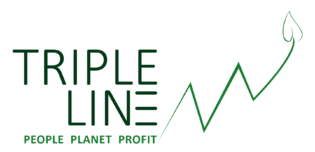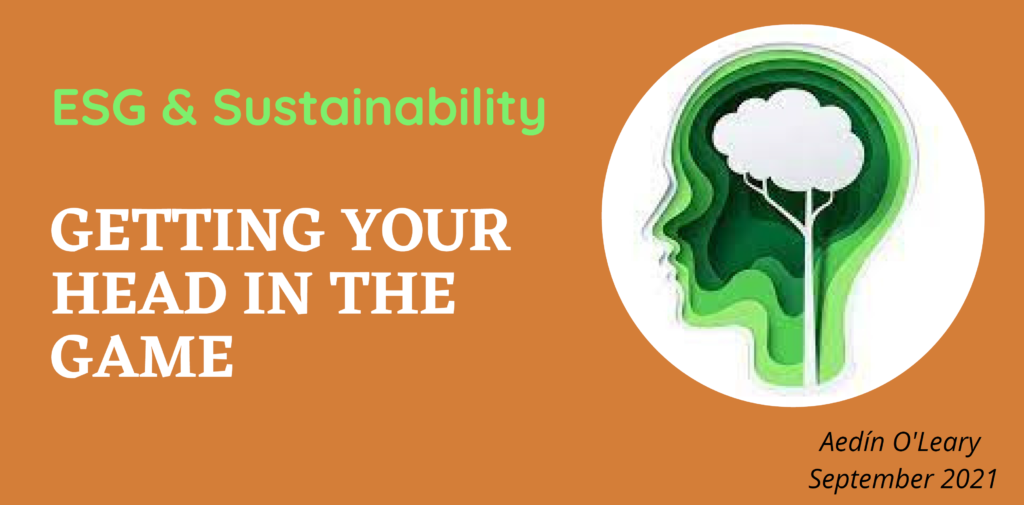
MEMBER’S BLOG: Expert Insights from Aedín O’Leary, iNED, Investment & ESG Consultant and Green Team Network Co-Founder.
Whether you welcome it or lament it, sustainability has entered the boardroom and is set on taking a permanent seat. However, it may not yet have its feet quite under the table, if the recent European Investment Bank report is anything to go by. (https://www.eib.org/en/publications/european-firms-and-climate-change-2020-2021) This report shows that only 19% of Irish businesses surveyed had set a climate target, compared to an EU average of 41%. If climate action by Irish companies remotely represents their overall efforts in sustainability, then there is clearly much more work to be done!
Granted, some companies are well under way with their Sustainability plans, whereas others are either struggling to get started or have made initial attempts and are stuck on where to go next. It is often assumed that larger, long-established companies with perhaps deeper pockets, bigger teams, access to resources, etc, will fare better and more easily in their sustainability endeavors. However, SMEs can often be more agile and adopt new practices more readily, while family businesses can have a head start by already having a values-oriented culture. It can often take longer to embed a culture of sustainability in a bigger business with more layers to get through.
Whether your business is big or small, an early or late adopter, below is my take on “getting your head in the game” and some ingredients for creating a meaningful, sustainable impact.
Health Warning: While I touch on all three ESG factors (Environmental, Social and Governance), please don’t be daunted by a busy list of suggestions! The link at the end of the article will signpost you separately to useful resources and contacts for exploring the terminology, next steps, supports available, sample templates and action plans.
1 The Right Mindset
In the sage words of Socrates: “The secret of change is to focus all of your energy not on fighting the old, but on building the new.”

Whilst integrating ESG across a business may create a significant additional workload, wasting precious time with excuses (the costs, scarce resources, belief that customers will remain satisfied) is pointless. It is, of course, key to view E, S and G, through a risk lens and to identify and mitigate those risks. However, ESG should also be viewed as an opportunity: to re-evaluate corporate purpose, to add value and to gain competitive advantage. Therefore, starting with tone from the top, a shift of mindset from burden (“we know we should”) to opportunity (“we can and we will”) is a healthy start.
2 Check Your Understanding
With a plethora of terms, definitions and acronyms (often conflicting), various nuances and regular new additions, the Sustainability terrain can be tricky to navigate. While work is under way in certain sectors towards standardised terminology and mandatory reporting (for example in the investment industry), we are still a long way off consensus. I’ve certainly witnessed widespread confusion – start a conversation about Net Zero, Carbon Neutral, Carbon Negative, Climate Positive and see how many of you are talking about the same issues by the time you finish!
Be satisfied that you, your board and management have an acceptable command of the main concepts and language for discussing ESG and sustainability. If you’re going to be involved in decisions in this area, at board or management level, a sensible start would be to ensure you are sufficiently acquainted with certain definitions, e.g. the UN Sustainable Development Goals, Climate Change, Global Warming, Paris Agreement, Carbon Reduction, Circular Economy, Transition Risk, Sustainable Financing, Global Reporting Initiative. (Add in UN PRI, SFDR, EU Taxonomy if you’re in the investment world!)
3 Your Sustainability Champion
While Sustainability is the responsibility of the whole board, who is driving this agenda in your organization? A designated “Sustainability Champion” can be your best asset here. There may well be a sustainability enthusiast right under your nose who would jump at the chance to mobilize the programme, would assemble a sustainability team and could be invaluable in educating the company (including directors) on this crucial topic. An enthusiastic champion, empowered by a supportive board (including maybe a board ambassador) will motivate others and accelerate a culture of sustainability in your organization.
4 Charting Your Course
To know where your company is going and how it will get there, consider drawing up a Sustainability Roadmap. If you’re daunted by the prospect, there is plenty of guidance to hand. These include online resources with sample templates and toolkits to set you on your way, suggested metrics for tracking progress and a variety of webinars and workshops. There are sustainability networks for different industries and actual road maps used by different companies available to view. You can also recruit Sustainability Consultants (sometimes with grants available towards payment), who will design your road map with you. Furthermore, upskilling on this area would be key, for example with the new IoD Ireland’s course, ‘Leading Sustainability: What Directors Need to Know and Do’,
Links to various templates and other useful resources for starting your journey can be found here: https://tripleline.ie/so-you-want-to-be-sustainable/
Ideally, your road map should:
- Define what Sustainability and ESG means for your company (both the risk and opportunity perspectives)
- Map your current baseline, in terms of relevant E, S and G metrics (carbon footprint, diversity stats, board composition etc)
- Include policies on E, S and G, each setting long-term targets (try to be ambitious)
- Create short-term goals and milestones along the route
- Define KPIs and measurement metrics for each category
- Identify who is responsible for delivering and reporting on the Sustainability Plan
- Show planned actions, resource needs and timelines.
If you can’t decide where your road map should take you, the UN Sustainable Development Goals can be a useful compass, i.e. 17 broad goals (several more sub-targets within these) for addressing a mix of environmental, social and governance related issues. Identify the goals where your company could have a real impact; you might just prioritise two or three of these to get under way. See sample factors to consider and actions to take in setting out your road map and developing policies here: https://tripleline.ie/charting-your-course-for-a-sustainable-future/
5 Catch the Low Hanging Fruit
There is no need to delay action while sustainability policies are being developed. Get started – a group activity like a beach clean-up or support of a charitable event could probably be arranged at short notice, would create an impetus and immediately signal your company’s intent to support the planet and society. Catch and celebrate these early wins, continually communicate progress and the momentum will build.
6 Leverage Your Network
Various umbrella bodies and networks have been established across particular industries, professions and themes, offering resources on sustainability either for free or as part of membership. These can enable your company to learn from the experiences of others and to amplify the collective effort. Also look at your professional services providers (accounting, legal, facilities) as many of these have established online Sustainability Hubs for clients. And not last, utilise the IoD network as a member, and connect with fellow leaders on this key issue.
Obviously, your company doesn’t want to be out of pocket by trying to “do the right thing” and be forced to pass on price increases to customers who aren’t willing to pay extra for the sustainable option. To stay competitive, therefore, also look through your value chain and to your suppliers to play their part in managing costs. Connect with your peers and even your cheaper competitors (they, too, will eventually come under pressure to be more sustainable) to find a collective approach and raise the standards of the whole industry.
7 Communicate Your Story …. Authentically
All businesses have some negative impact, especially on the environment. In sustainability, it’s about being transparent and showing how your company is adapting and improving. In a world of spin and fears over greenwashing, be cautious. You are, quite rightly, under public scrutiny and risk being hung out to dry if found to be inaccurate or misleading. So, by all means, make grand declarations and promises, but be sure you can follow them up with proof of delivery or a willingness to openly admit if progress falls short.
Celebrate ESG successes and communicate your stories, big and small. Done well, this will have a ripple effect and pull any naysayers along in the journey. Think seriously and pro-actively about how the company is going to report on sustainability – perhaps a simple approach with fewer metrics if you are only starting, evolving to a more sophisticated, granular approach fit for external purposes as you advance and as universal or mandatory reporting standards develop.
8 Support at the Helm
In sustainability terms, the board’s task is to: (1) make sure the company doesn’t miss the wave when everyone else is already getting on, and (2) that of all the boats out there, it boards the right one. A strong hand at the helm and active buy-in from the board when blending the above “ingredients” will be critical to embedding a culture of sustainability throughout your organisation. Board and management should convey throughout the company how its chosen sustainability route aligns with its corporate goals, and then they must also ‘Walk the Talk’.
If you’re still wavering about progressing your sustainability journey, just remember…
“The rising tide lifts all the boats.” – John F. Kennedy

Now, board your boat.
For more information and resources related to the above suggestions, visit www.TripleLine.ie
About the Author:
Aedín O’Leary is an Independent Director, Investment & ESG Consultant with over 25 years’ experience in the asset management industry, spanning multiple asset classes (traditional and alternative) and differing mandates. She consults on Asset Manager Selection (particular focus on ESG) and on Strategy for Investment Firms in relation to Launch and Distribution of Funds.
Aedín is Co-Founder of the Green Team Network, an initiative which devises collaborative solutions for the Irish Funds industry to tackle Climate Change and Sustainability (https://www.greenteamnetwork.ie/about). She is also a member of the Ethical Advisory Group for Appian Asset Management and of the ESG Working Group at the Investment Fund Directors Association. Aedín also has substantial engagement with the Not-for-Profit sector with particular focus on Governance, Regulation and Risk.

